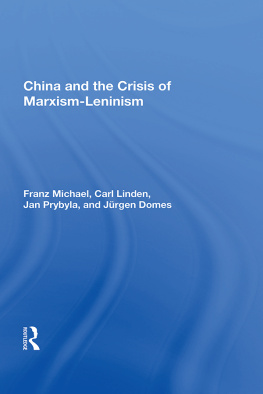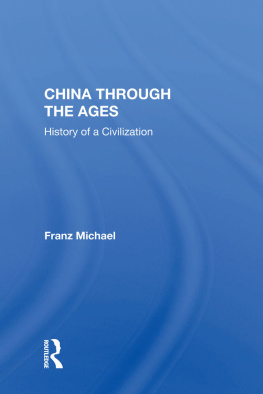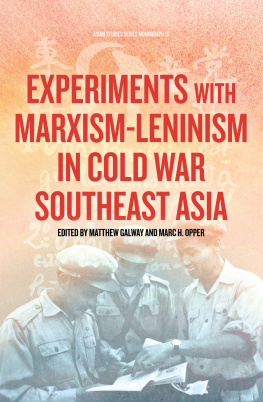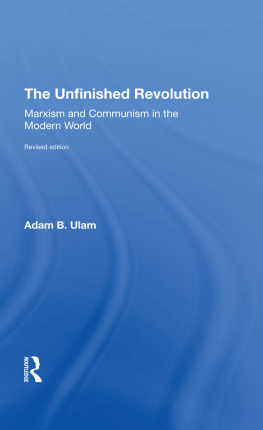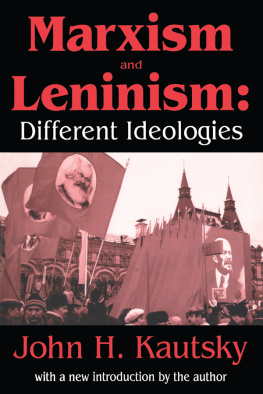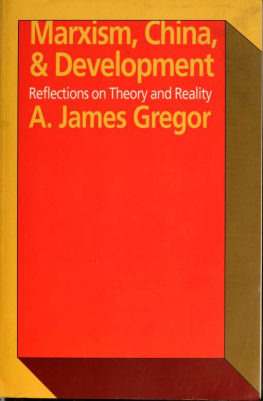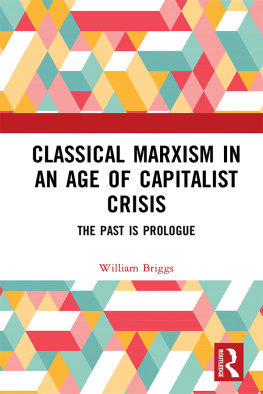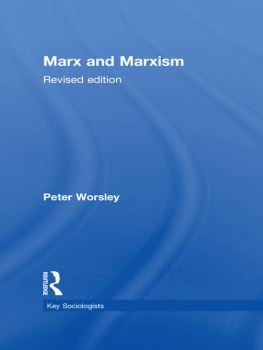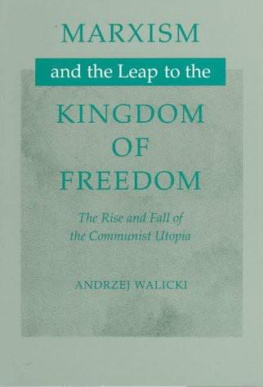China and the Crisis of Marxism-Leninism
First published 1990 by Westview Press
Published 2018 by Routledge
52 Vanderbilt Avenue, New York, NY 10017
2 Park Square, Milton Park, Abingdon, Oxon OX14 4RN
Routledge is an imprint of the Taylor & Francis Group, an informa business
Copyright 1990 by Taylor & Francis
All rights reserved. No part of this book may be reprinted or reproduced or utilised in any form or by any electronic, mechanical, or other means, now known or hereafter invented, including photocopying and recording, or in any information storage or retrieval system, without permission in writing from the publishers.
Notice:
Product or corporate names may be trademarks or registered trademarks, and are used only for identification and explanation without intent to infringe.
Library of Congress Cataloging-in-Publication Data
China and the crisis of Marxism-Leninism / Franz Michael [et al.].
p. cm.
Includes bibliographical references.
ISBN 0-8133-7911-3
1. CommunismChina. 2. ChinaPolitics and government1976 .
3. ChinaEconomic conditions1976 . I. Michael, Franz H.
HX419.C437 1990
335.4345dc20
90-36188
CIP
ISBN 13: 978-0-367-01461-2 (hbk)
Contents
, Franz Michael
, Carl Linden
, Jan Prybyla
, Jan Prybyla
, Jan Prybyla
, Franz Michael
, Franz Michael
, Jrgen Domes
, Franz Michael
, Franz Michael
Guide
The idea for this book was first formed in the fall of 1986, when the presumed success of the new communist reform policy in China raised the question whether Marxism-Leninism could actually be salvaged by a new approach to the economic and political problems of a communist country. Beijing had apparently abandoned agricultural collectivization and communization and instead had settled on fifteen-year leaseholds to individual peasant families, permitting them free use of land beyond the taxed amount for products sold on local free markets. As a result agricultural production swiftly increased. Certain of their agricultural success, the Chinese communist leaders decided to turn their reformist efforts to urban industry, applying a similar method of production on the basis of contract arrangements.
Could there be found, through this policy of production by contract, a middle way between a socialist command economy in a totalitarian order and a free market economy in a pluralist Western society? Could Marxism-Leninism, which had failed in its Stalinist order, find another system that would succeed while saving the basic Marxist-Leninist principles? For the Chinese communist leaders, this would be the way for communism to survive. The answer to this question was of such crucial importance, not only to the communist world but also to the Western world, that it required an urgent study.
The crisis began in China where Mao Zedongs utopian fantasies had aggravated the Stalinist failure, and where a leadership under Deng Xiaoping introduced this new tentative approach and compared it to the use of stepping-stones across a river on the way toward an unknown other shore. The new policy would deal not only with economies but also with changes in the political order, recognized as being interdependent with economics, and by necessity with ideology itself and with the cultural aspects of the social order. To study these attempted reforms and the actual realities clearly required an interdisciplinary approach. Therefore, we organized an interdisciplinary team of research scholars to work in close cooperation with each other. The four final members of our team are Carl Linden, professor of political theory at the George Washington University, specialist in Marxism-Leninism and Soviet ideology; Jan Prybyla, professor of economics at Pennsylvania State University and specialist on Chinese economics; Franz Michael, formerly director of the Institute for Sino-Soviet Studies of George Washington University, Chinese historian, and director of the project; and Jrgen Domes, professor Fachgebiet Politikwissenschaft der Universitt des Saarlandes, specialist in Chinese government and politics. These four members of the team are in full agreement on the common topic, although each assumes by himself full responsibility for his chapters, as marked by his signature.
We are most grateful for the support of the Lynde and Harry Bradley Foundation and the Earhart Foundation, which made our work possible.
Franz Michael
1
Introduction
Franz Michael
More than seven decades have passed since the Bolshevik Revolution produced the Soviet government in Moscow, followed after World War II by the communist takeover of neighboring countries in Eastern Europe and Asia and the establishment with Soviet support of a few communist regimes in other parts of the world. In all these years, Marxism-Leninism has had ample opportunity to demonstrate the validity of its premises. By now, however, it has become evident that the economic tenets of Marxism as applied in these countries have been seriously flawed, that the economic policies based on these tenets have failed, and that the communist governments in some of these countries, beginning in the Peoples Republic of China (PRC), and now in all of Eastern Europe, are seeking new formulas to overcome economic stagnation and failure. In the PRC the Communist leaders try to accomplish these departures from economic planning without changing the ideological and structural framework of their Marxist-Leninist systemthat is, without having to abandon the basic foundation of their power structure and their ideology. In Eastern Europe, and perhaps in the Soviet Union itself, they are beginning to break with Marxism-Leninism itself.
While the rest of the world watches these efforts with intense interest, their success or failure is of such obvious importance to both democratic and socialist countries that the time has clearly come to examine not only the specifics of these policies but the status of the ideological and political foundation of Marxism-Leninism. Because the crisis has reached its first serious extent in the PRC, it serves as the focus for this reappraisal.
To begin with, let us recall the chief assertions of Marxism-Leninism. It was Karl Marxand Fredrich Engelswho developed the idea of
It was V. I. Lenin who conceived the notion of a tight group of highly disciplined professional revolutionariesthe vanguard of the proletariatwho were trained in scientific socialism and possessed the historical truth. According to Lenin, the party could not fail to find the correct decision, which would be arrived at by democratic centralism. In reality, the party was controlled by the leadership, and this control turned into one-man rule. This has been the experience in the Soviet Union from Lenin to Mikhail Gorbachev, in China from Mao Zedong to Deng Xiaoping, and in all other communist countries.
This one-man rule is inherent in the system. Lenin often stated that the will of the mass of people could be ascertained only through organization and that the will of hundreds and tens of thousands could be formed in one mans mind. This concept pervades all Lenins writings and is imbedded in Soviet texts. According to the basic Soviet textbook, Fundamentals of Marxism-Leninism, there is a social need for great men. The book spells out their special abilities in great detail.

